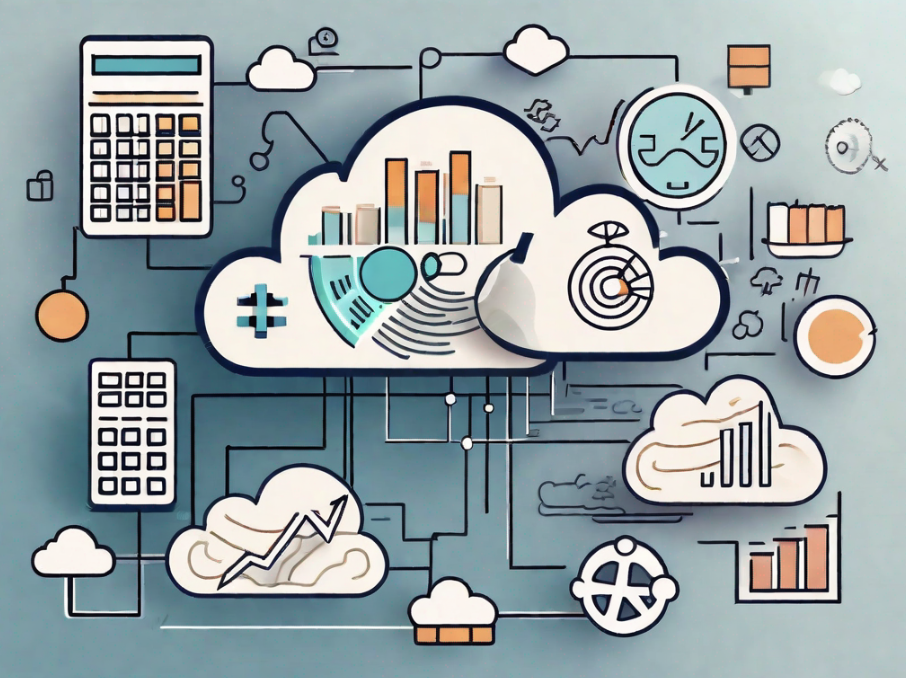Will AI Replace Accountants?
Discover the fascinating future of the accounting industry as we delve into the question, “Will AI replace accountants?” Explore the potential impact of artificial intelligence on traditional accounting roles, the benefits and challenges it brings, and whether human accountants can adapt to this rapidly evolving technological landscape.

Artificial intelligence (AI) has rapidly transformed numerous industries, and its impact on accounting is no exception. Accountants using technology to improve efficiency face challenges and opportunities with the rise of AI. In this article, we will delve into the various aspects of AI in accounting and assess its potential to replace accountants.

Assessing the Impact of AI on Accountants
The question of whether AI will replace accountants hinges on various factors. While AI technologies have streamlined many accounting tasks, from data entry to analysis, the role of accountants remains essential for complex decision-making and strategic financial planning. Moreover, the emergence of roles like the Fractional CFO underscores a trend towards specialized, human-centric financial management.
Fractional CFO blend expertise with technology, offering tailored insights and guidance crucial for businesses navigating dynamic markets. Therefore, while AI may automate routine accounting functions, the nuanced expertise and strategic acumen of accountants, particularly those in specialized roles like Fractional CFO, are likely to remain indispensable in the realm of financial management.
The integration of AI into accounting practices is reshaping the role of accountants in fundamental ways. AI-powered technologies can automate repetitive tasks such as data entry, reconciliations, and report generation, allowing accountants to focus on higher-value activities. With the advent of AI, the profession is undergoing a significant transformation, demanding accountants to adapt and embrace these technological advancements to remain relevant.
One of the key benefits of AI in accounting is its ability to streamline data entry processes. Traditionally, accountants spent countless hours manually inputting financial data into spreadsheets or accounting software. This tedious task not only consumed valuable time but also increased the risk of human error. However, with AI-powered tools, accountants can now automate the data entry process, reducing the likelihood of mistakes and freeing up their time for more strategic and analytical work.
Furthermore, AI can greatly enhance the accuracy and efficiency of reconciliations. Reconciling financial statements and identifying discrepancies can be a time-consuming and complex task for accountants. AI algorithms analyze lots of data and find mistakes, so accountants can fix them quickly. This not only saves time but also improves the overall accuracy of financial reporting, ensuring that businesses have reliable and trustworthy financial information.
Another area where AI is revolutionizing the accounting profession is report generation. Generating financial reports can be a labor-intensive process, requiring accountants to compile data from various sources and format it into a coherent and understandable report. AI tools can automate reporting by pulling data from multiple systems and creating detailed reports with minimal human involvement. This not only saves time but also ensures that reports are consistently formatted and standardized, making it easier for stakeholders to interpret and analyze the information.
While AI offers numerous benefits to accountants, it is important to acknowledge the challenges that come with its integration. One concern is the potential displacement of certain accounting tasks due to automation. As AI takes over repetitive and mundane tasks, some accountants may fear that their roles will become obsolete. However, it is crucial to recognize that AI is not meant to replace accountants but rather augment their capabilities. By automating routine tasks, AI allows accountants to focus on more strategic and value-added activities, such as financial analysis, forecasting, and providing insights to drive business decisions.
Moreover, the integration of AI in accounting requires accountants to develop new skills and adapt to changing technologies. Accountants must become proficient in utilizing AI tools and interpreting the insights generated by these technologies. This necessitates a shift in mindset and a commitment to lifelong learning. Accountants who embrace AI and continuously update their skills will be better positioned to thrive in the evolving accounting landscape.
What Does AI Bring to Accounting?
AI offers accountants a plethora of benefits. One of its key advantages is the ability to analyze vast amounts of data swiftly and accurately. Through machine learning algorithms, AI can identify patterns and anomalies in financial transactions, enabling earlier detection of fraud and providing valuable insights for decision-making. Additionally, AI-powered accounting software automates routine tasks, reducing errors and eliminating tedious manual work.
Let’s delve deeper into the ways in which AI revolutionizes the field of accounting. With its advanced data analysis capabilities, AI can process and interpret financial data at a speed that surpasses human capacity. This allows accountants to gain a comprehensive understanding of a company’s financial health in a fraction of the time it would take using traditional methods.
Furthermore, AI algorithms can detect patterns and trends in financial data that might go unnoticed by human accountants. By analyzing large volumes of data, AI can identify correlations and anomalies that can provide valuable insights for decision-making. For example, AI can identify patterns in customer purchasing behavior that can help businesses optimize their pricing strategies or identify potential upselling opportunities.
Another significant advantage of AI in accounting is its ability to enhance fraud detection. Traditional methods of fraud detection often rely on manual reviews and audits, which can be time-consuming and prone to human error. AI-powered systems, on the other hand, can quickly analyze vast amounts of financial data and identify suspicious patterns or transactions that may indicate fraudulent activity. This early detection can save companies significant financial losses and protect their reputation.
In addition to fraud detection, AI can also improve the accuracy of financial reporting. By automating routine tasks such as data entry and reconciliation, AI-powered accounting software reduces the risk of human error and ensures that financial statements are prepared accurately and in a timely manner. This not only saves time for accountants but also enhances the overall reliability of financial information.
Moreover, AI can assist accountants in making more informed decisions by providing them with real-time insights and predictive analytics. AI algorithms analyze financial data and trends to make forecasts and projections, helping businesses plan and make strategic decisions. This can be particularly valuable in industries with fluctuating market conditions or when considering investment opportunities.

It is important to note that while AI brings numerous benefits to the field of accounting, it does not replace the need for human accountants. Rather, it complements their skills and expertise, allowing them to focus on more complex tasks that require critical thinking and judgment. The combination of AI and human intelligence can lead to more efficient and effective accounting practices.
The Pros and Cons of AI-Driven Accounting
The rise of AI-driven accounting presents both advantages and disadvantages. On the plus side, AI can significantly enhance accuracy, efficiency, and productivity in accounting processes. By automating repetitive tasks, accountants can focus on analysis, strategy, and adding value to their organizations.
One of the key advantages of AI-driven accounting is its ability to handle large volumes of data with speed and precision. With AI algorithms, accountants can process and analyze vast amounts of financial information in a fraction of the time it would take a human. This not only improves efficiency but also reduces the risk of human error, which can be costly in the world of accounting.
Furthermore, AI-driven accounting systems can continuously learn and adapt to changing financial regulations and industry standards. This ensures that the accounting processes remain up-to-date and compliant, reducing the risk of non-compliance penalties and legal issues.
While the integration of AI into accounting raises questions about the potential displacement of accountants, particularly those in Controller roles, it’s essential to recognize the positive aspects. AI-driven accounting offers significant efficiency gains in automating routine tasks. Despite the automation, the strategic financial oversight, nuanced interpretation, compliance assurance, risk management, and insightful decision-making abilities of Controllers remain invaluable.
Another benefit of AI-driven accounting is its ability to provide real-time insights and analytics. Accountants can use real-time financial data to make better decisions and find trends and patterns that may not be obvious. This can help businesses optimize their financial strategies and improve overall performance.
However, concerns surrounding job displacement and the potential for human error in AI systems persist. While AI can automate many repetitive tasks, there is a fear that it may replace human accountants altogether. This raises questions about the future of the accounting profession and the need for upskilling and reskilling to adapt to the changing landscape.
Additionally, the reliance on AI systems introduces the risk of errors or biases in the algorithms themselves. If the AI system is not properly trained or if the data used to train it is biased, it can lead to inaccurate financial reporting and decision-making. This highlights the importance of thorough testing, validation, and ongoing monitoring of AI-driven accounting systems to ensure their reliability and integrity.
Striking the right balance between automation and human involvement remains a critical challenge. AI can make things easier and faster, but humans are still needed for complicated thinking and decision-making. Accountants need to find ways to leverage AI technology while maintaining their value as trusted advisors and strategic thinkers.
Examining the Potential of AI for Accountants
AI has the potential to revolutionize how accountants operate. Advanced machine learning algorithms can process complex financial data, detect patterns, and generate insights. This allows accountants to make more informed decisions, improve forecasting accuracy, and identify areas for cost savings. The integration of AI also spurs innovation, enabling businesses to explore new ways of delivering financial information and improving financial planning and analysis.
One area where AI can greatly benefit accountants is in automating repetitive tasks. Traditionally, accountants spend a significant amount of time manually inputting and reconciling data. With AI, these tasks can be automated, freeing up accountants to focus on more strategic and value-added activities. For example, AI-powered software can automatically categorize expenses, match invoices with purchase orders, and reconcile bank statements. This not only saves time but also reduces the risk of human error.
Furthermore, AI can enhance fraud detection in accounting processes. By analyzing large volumes of financial data, AI algorithms can identify irregularities and flag potential fraudulent activities. This can help accountants proactively detect and prevent financial fraud, protecting businesses from significant financial losses. Additionally, AI can continuously monitor financial transactions in real-time, providing immediate alerts for suspicious activities, further strengthening the security measures in place.
Another area where AI can make a significant impact is in financial analysis and reporting. AI algorithms can analyze vast amounts of financial data and generate comprehensive reports in a fraction of the time it would take a human accountant. This enables businesses to have up-to-date financial information readily available, facilitating quicker decision-making processes. AI can help accountants understand a company’s financial health and performance by finding trends, correlations, and anomalies in financial data.
The implementation of AI in accounting also opens up new possibilities for collaboration and knowledge sharing. AI-powered platforms can facilitate seamless communication and collaboration between accountants, enabling them to work together on complex financial projects. These platforms can also serve as repositories of knowledge, storing and organizing vast amounts of financial data, regulations, and best practices. This not only improves efficiency but also promotes continuous learning and professional development among accountants.
Is AI a Threat or an Opportunity for Accountants?
The question of whether AI poses a threat or an opportunity to accountants is a topic of intense debate. While AI has the potential to automate certain tasks traditionally performed by accountants, it also opens up new avenues for career advancement. By embracing AI and acquiring the necessary skills, accountants can adapt to the changing landscape and position themselves to add greater value to organizations. AI can empower accountants to become trusted advisors, leveraging technology to provide strategic insights and guidance.
One area where AI can greatly benefit accountants is in data analysis. With the vast amount of financial data available, AI algorithms can quickly analyze and identify patterns, anomalies, and trends that may have been overlooked by human accountants. This not only saves time but also enhances the accuracy and reliability of financial reporting. Accountants can then focus their efforts on interpreting the results and providing valuable insights to decision-makers.
Furthermore, AI can assist accountants in streamlining routine tasks such as data entry, reconciliations, and financial statement preparation. By automating these repetitive processes, accountants can free up their time to focus on more complex and strategic activities. This shift in responsibilities allows accountants to develop their analytical and problem-solving skills, enabling them to provide more comprehensive and valuable financial advice to clients.
Another aspect of AI that presents opportunities for accountants is the ability to enhance fraud detection and risk management. AI algorithms can analyze large volumes of financial data and identify suspicious transactions or patterns that may indicate fraudulent activities. By leveraging AI-powered tools, accountants can proactively identify and mitigate potential risks, safeguarding the financial integrity of organizations.
Moreover, AI can facilitate collaboration and knowledge sharing among accountants. With the advent of cloud-based platforms and AI-powered chatbots, accountants can easily access and share information, best practices, and industry insights. This teamwork helps accountants keep learning and growing professionally, staying updated on the latest trends and rules in their field.
While there are concerns about job displacement due to AI, it is important to note that AI cannot replace the human element in accounting. Accountants possess valuable skills such as critical thinking, judgment, and ethical decision-making, which are essential in interpreting and applying financial information. AI should be seen as a tool that enhances the capabilities of accountants rather than a replacement for their expertise.
Exploring the Benefits of AI for Accounting Tasks
AI brings significant advantages to accounting tasks, including efficient data analysis, accurate transaction categorization, streamlined financial statement preparation, enhanced auditing processes, and valuable insights for decision-making. As technology continues to advance, the role of AI in accounting is expected to grow, empowering accountants to deliver more value to businesses and clients.

Could Automation Render Accountants Obsolete?
As automation continues to advance, concerns arise over the possibility of accountants becoming obsolete. While AI can automate several routine accounting tasks, the complex nature of the profession necessitates human involvement. Accountants possess the expertise to interpret financial data, provide strategic insights, and make informed decisions. Rather than rendering accountants obsolete, automation amplifies their capabilities, enabling them to focus on higher-level analysis and value-added tasks.
How Can Accountants Compete with AI?
To compete with AI, accountants need to embrace technology and develop new skill sets. By acquiring knowledge in data analytics, AI systems, and advanced accounting software, accountants can remain ahead of the curve. Moreover, enhancing communication and collaboration skills is crucial for accountants to effectively communicate financial insights to stakeholders and become trusted advisors. Continuous learning and staying updated with technological advancements are key to thriving in an AI-driven accounting landscape.
What Skills Will Accountants Need to Stay Relevant?
In an AI-dominated era, accountants must cultivate a diverse set of skills to ensure relevance. Technical proficiency in data analytics, data visualization, and emerging technologies is essential. Additionally, strong critical thinking, problem-solving, and adaptability skills are required to navigate the complex financial environment. Accountants should also hone their soft skills, including effective communication, leadership, and relationship-building, enabling them to provide strategic guidance and build trust with clients and stakeholders.
The Future of AI and Accounting: A Discussion
The future of AI and accounting holds promising opportunities for those who are prepared. As AI rapidly evolves, accountants must be proactive and embrace technological advancements. Accountants who use AI effectively will succeed and be better equipped to meet clients’ and organizations’ changing needs. By leveraging AI as a tool and continuing to add value through analysis, strategic insights, and advisory services, accountants can secure their relevance and adapt to the changing landscape of the profession.

IN CONCLUSION
While AI brings numerous advancements to the accounting field, the notion of it replacing accountants entirely seems unlikely. Rather, AI provides opportunities for accountants to evolve, expand their skill sets, and add value to their organizations. Accountants can improve their work by using AI. It helps them be more productive, make better decisions, and become trusted advisors in accounting.
It All Starts With a FREE consultation!
Every client’s needs are unique and require varying amounts of time and attention. You can use this form to let us know what you’re looking for, and we’ll reach out to you to schedule an appointment and talk about rates for your business needs.
Please be as detailed as possible with what work is needed, what industry your business is in, and where you are located.
Our team will contact you with in 2 business days to set up the first meeting. We will make sure all your needs are taken into account when selecting the package and type of services you need.






Stay In Touch